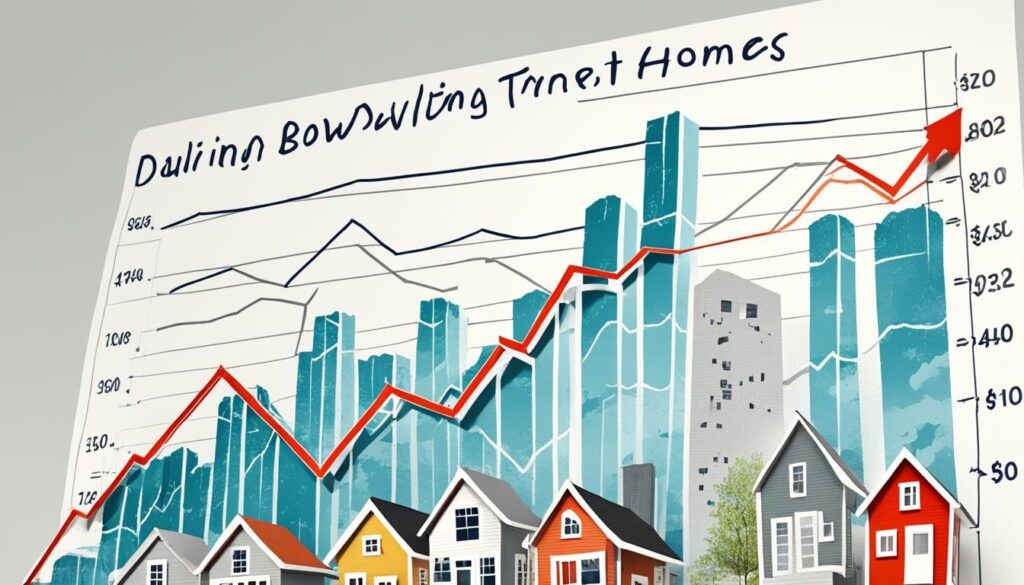“As an Amazon Associate I earn from qualifying purchases.”
During the 2020 recession, an unexpected 92% of real estate agents surveyed felt the market was resilient, painting a deceptively rosy picture of an industry often racked with real estate challenges during economic downturns. This surprising statistic brings to the forefront the complexity of recession home sales, where, despite a demonstrated strength in the housing market, sellers face a turbulent journey peppered with potential pitfalls.
Before a housing market downturn, you might observe median home prices peaking, tempting you to leverage what seems like a lucrative seller’s market. However, when a recession is in full swing, the real estate landscape is upended by unpredictability, with buyer demand in flux and stricter financing conditions becoming major hurdles. This sets the stage for a market that, despite previous vigor, becomes harder to navigate for those looking to sell their homes.
Key Takeaways
- The perceived strength of the housing market can be misleading during a recession.
- Housing market downturns introduce volatility that affects buyer demand and property values.
- Selling a home at the ‘right’ time becomes a complex decision against a backdrop of economic instability.
- A recession can alter the dynamics of a seller’s market, creating real estate challenges due to reduced buyer financial power.
- Understanding and adapting to market conditions is crucial for homeowners considering a sale during tough economic times.
The State of the Real Estate Market During Economic Downturns
While economic downturns typically hint at a contraction in the housing market, recent events have painted a different picture, revealing an unexpected tenacity. Your ability to navigate this terrain is essential, as factors like economic downturn impact, real estate market trends, and housing market resilience become increasingly relevant.
The Surprising Strength of Home Sales in 2020
The year 2020 will long be remembered for its unprecedented global events, yet astonishingly, the real estate market resisted the downward spiral many sectors faced. According to HomeLight’s Q3 data, the housing market clinched a notable increase in home prices, surprising many with a strong sellers’ market vibe amid the chaos.
Amidst economic strain, the real estate market experienced a 5% to 6% rise in home values, instigating competitive scenarios often resulting in bidding wars for prized properties. – HomeLight Q3 2020 Survey
Unpredictable Market Conditions
As mortgage rates fluctuate and the specter of a recession lingers, the real estate market is subject to a level of unpredictability. The twists and turns of interest rates, alongside various shifts in buyer behavior, have forged an atmosphere where certainty is a luxury one can scarcely afford.
Looming Threat of Recession on Home Values
The prospect of economic downturns typically signals a chilling effect on home values, but history recalls episodes of remarkable housing market resilience. Take note, except for the stark anomaly witnessed during the 2008 crisis, the resilience of real estate has frequently withstood the test of economic turbulence.
| Year | Avg. Home Value Increase | Market Condition |
|---|---|---|
| 2020 | 5-6% | Seller’s Market |
| 2008 | N/A | Bubble Burst |
| Pre-Downturn | Varies | Peak Values |
In times of financial stress, such as the recessionary climates we brace against, your understanding of market movements is crucial. Recognizing patterns in real estate market trends not only aids in making informed decisions but also prepares you to better seize opportunities amidst challenges.

Why It Is Difficult to Sell a Home During a Recession?
If you’re attempting to sell a property amidst an economic downturn, you’re likely facing a multitude of selling challenges. With each new report of economic contraction, the prospect of selling homes gets tougher due to buyer scarcity, directly affecting the real estate market. Lower property values are often a bitter pill to swallow, and developing effective recession sales strategies becomes crucial for navigating this complex landscape.
Let’s explore the core issues compounding the difficulty of home selling during such periods:
- Consumer confidence dips as uncertainty around job stability increases, leading to caution in making significant financial commitments.
- Lending institutions often impose stricter borrowing criteria, further reducing the number of prospective buyers able to secure financing.
- With a shrinking pool of buyers, properties remain on the market for longer, sometimes necessitating price reductions to attract interest.
- Market dynamics can shift to favor buyers, who may drive a hard bargain knowing that there are fewer competing offers.

The following table encapsulates a side-by-side comparison of typical market conditions during stable times alongside the challenges faced during a recession.
| Market Condition | During Stable Times | During Recession |
|---|---|---|
| Buyer Demand | High | Reduced |
| Property Values | Stable or Increasing | Potentially Decreasing |
| Listing Period | Shorter | Longer |
| Negotiating Power | Seller-Favored | Buyer-Favored |
| Loan Approvals | More Common | Less Common |
Understanding these dynamics can empower you to tailor your sales approach, whether that means adjusting your asking price or enhancing your property’s appeal. Perseverance, flexibility, and strategic pricing will be your allies in overcoming the inherent hurdles of a recession-era real estate transaction.
Understanding Buyer and Seller Psychology in Uncertain Times
As the economy braves the psychological impact of a recession, both home buyers and sellers navigate uncharted waters fraught with investment decisions and market uncertainties. Let’s decrypt the psychology behind their behaviors and strategies during these volatile periods.
Homeowner Concerns and Sales Resistance
Homeowners often face a dilemma during recessionary times; sell now, or wait for market improvements? Concerns about slow home sales, and the prospects of reduced profits, lead to sales resistance. Instinctively, many homeowners opt to hold off on listing their homes, bracing for a lengthy sales process or a potential decrease in their property’s value.
Investor Strategies and Buying Power
In contrast to homeowners, investors perceive recessions as golden opportunities for expanding their portfolios. With a decrease in competition and falling property prices, they strategically position themselves to make investments that could yield substantial returns once the market stabilizes.
Consumer Confidence Levels
The level of confidence consumers have in the economy greatly influences their willingness to engage in major financial transactions like buying a home. With each news cycle touting economic downturns, their confidence may waver, prompting a more cautious approach to any large-scale investments.
| Market Player | Psychological Stance | Potential Actions |
|---|---|---|
| Homeowners | Cautious, risk-aware | Postpone selling, await market recovery |
| Investors | Opportunistic, risk-tolerant | Acquire undervalued properties, leverage lower prices |
| Consumers | Varying confidence based on economic outlook | Delay large investments, seek lower-risk opportunities |
The economic ambience created by a recession underscores the myriad of psychological factors at play. Knowing your position and the general sentiment can assist in making informed decisions amidst the prevailing market uncertainties.
The Ripple Effects of Recession on Home Selling
As recession repercussions unfold, sellers witness transformative housing market dynamics, leading to a discernible seller’s market shift. You may observe the immediate impact of economic downturns reflected in the subdued enthusiasm of buyers, who grapple with the volatility of their financial status.
Amidst a recession, the demand for housing typically wanes, burdened by the insecurity of employment and tightened lending norms. This new seller reality implores an adjustment in strategy, with potential postponement of property listings until the market climate becomes more accommodating.
- Increased time on market
- Shift towards more competitive pricing
- Potential for lower-than-expected offers
If you’re contemplating selling during adverse economic times, it’s crucial to analyze these indicators and adjust expectations accordingly.
As the market courses through these transitions, sellers who exhibit adaptability hold a strategic advantage. It is instrumental to stay informed about market conditions, perhaps exploring temporary alternatives such as renting, to weather the storm until a seller’s market reemerges.
Pros and Cons: Timing Your Home Sale
Understanding the optimal selling period for your home is pivotal, particularly as the market ebbs and flows with the larger economic climate. Weighing the advantages and drawbacks of your home sale timing can significantly impact the return on your investment. As you contemplate when to list your property, consider the various scenarios that could unfold in tandem with the shifting economic landscape.
Selling Before the Economic Decline Hits
Before the storm clouds of recession gather, the housing market often experiences a surge, characterized by peak prices and high competition among buyers. This optimal selling period presents an opportunity for you to capitalize on the market fervor and maximize your property’s value. Skilled in strategic home sales, sellers can often command top dollar and multiple offers during this pre-recession window. However, this prosperous selling period is not without its challenges. Here’s a glance at what you may face:
- Increased buyer demand may prompt bidding wars, inflating the sale price of your home.
- The need to act swiftly before the market dips could pressure decision-making.
- Finding your next home becomes a race against time and against other buyers.
The Challenges of Selling During Recessionary Times
Contrasting the bustling activity of a seller’s market, the scenario shifts as a recession sets in. The once-vibrant housing landscape can cool down, leading to a reduced sense of urgency among potential buyers. You may face a market marked by cautious spenders and reduced property valuations.
| Market Condition | Impact on Sale | Considerations |
|---|---|---|
| Lower Home Valuations | Potential reduction in selling price | Adjust expectations and set a competitive asking price |
| Increased Listing Periods | Homes may stay on the market longer | Prepare for potential holding costs and market fluctuation |
| Buyers’ Market Emerges | Buyers have more leverage in negotiations | Focus on highlighting unique home features and closing incentives |
Evaluating the Market for Strategic Decision Making
Strategic home sales amid recession timing call for a savvy understanding of market conditions and the ability to adapt your approach accordingly. The key lies in analyzing market data, economic indicators, and buyer behavior to assess the viability of listing your home. By doing so, you can align your sales strategy with the overarching economic context and make an educated decision based on facts rather than speculation.
“The art of selling one’s home is as much about timing as it is about presentation and price. One must navigate the currents of the economy with precision and strategy to ensure an optimal outcome.” – Renowned Real Estate Expert
In conclusion, your journey to sell your home is nuanced by the state of the economy and its sway over buyer sentiment. Consideration for the optimal selling period and recession timing may ultimately steer your decision whether to brave the market’s shifting tides or to delay until a resurgence of buyer activity. With strategic planning and informed decisions, you can maximize your success regardless of when you choose to sell.
How Mortgage Rates and Lending Standards Influence Sales
When exploring the homebuying process, understanding the interaction between mortgage rates, lending criteria, and the housing market response is pivotal. These financial factors collectively create an environment that either propels or hinders home sales—a phenomenon closely observed during recessionary periods.
Historical Trends and Future Predictions
Traditionally, mortgage rates have exhibited a downward trend during recessionary times, which might appear advantageous for buyers at first glance. Yet, the real impact on the housing market is intricately tied to lending standards that often tighten in parallel, challenging the potential influx of buyers despite appealing rates.
The Impact of Government Policies and Interventions
The ebb and flow of mortgage rates and lending terms are substantially affected by governmental policy. Stimulus measures and federal interventions, such as adjustments to interest rates or the introduction of homeowner assistance programs, can mitigate or intensify these effects, ultimately guiding market behaviors.
Loan Availability and Buyer’s Financial Power
The lens through which buyers view the housing market is significantly affected by their ability to secure loans. Lending standards, capturing elements like credit worthiness and down payment requirements, dictate the financial power that buyers hold—a critical driver in determining the ongoing sales activity in property markets.
| Economic Condition | Mortgage Rate Trend | Lending Criteria Adjustment | Expected Market Response |
|---|---|---|---|
| Recession | Decrease | Tightening | Reduced buyer pool |
| Recovery | Stabilization or Increase | Loosening | Increase in qualified buyers |
| Booming Economy | Varies | Varies | High market activity |
The Counterintuitive Behavior of Rental Markets in Recessions
When the real estate market braces for the impact of an economic recession, an unexpected trend often emerges within the rental sector. This phenomenon exhibits a stark contrast to the plummeting home sales during such periods, with rental market dynamics veering off the anticipated path. Instead of a decline, rental prices may actually rise, as the housing demand shift leans towards temporary housing solutions. The rationale behind this trend involves a mix of former homeowners seeking rentals post-sale and a contingent of society unable to qualify for home loans due to the tightened lending criteria that come with recessions.
Understanding these recession rental trends is crucial if you’re navigating the housing market, whether as a landlord seeking to price your rentals appropriately, or as a consumer gauging the cost of renting during economic downturns. Let’s delve into how these dynamics unfold:
- Increased demand for rentals from former homeowners
- Greater rental market participation by individuals unable to access home financing
- Escalating rental prices due to heightened demand
While homeowners may lament over depreciating sale values, landlords might find a silver lining as the renter population grows. However, for renters, this can mean an upsurge in living costs when budgets are already strained by broader recessionary effects. The key takeaway here highlights the importance of staying abreast with housing demand shift to make informed decisions in the rental market.
As the homebuying sector retracts during a recession, the rental market often fills the void, becoming a bustling hub for those in search of a home without the long-term financial commitment.
With this in mind, here are steps you can take:
- Evaluate the local market to assess demand and rental price trends.
- Consider the long-term impact of recession rental trends on your investment.
- Stay informed about broader economic indicators that influence the rental market.
Rental market behaviors during recessions underscore the complexity and interconnectedness of different housing sectors. As you witness these counterintuitive trends, remember that they form part of a larger tapestry that defines the shifting landscape of the American housing market.
Conclusion
In sum, while economic tides ebb and flow, so too does the robustness of the real estate market. Its ability to withstand the test of time and turbulences like those presented by recessions is a testament to the sector’s underlying strength. As you consider selling your home in these uncertain times, remember that successfully navigating this landscape involves a keen understanding of market behaviors and, most crucially, impeccable timing.
Real Estate’s Resilience and the Importance of Timing
Throughout myriad market fluctuations, real estate has continually displayed a unique kind of adaptability. This resilience serves as a guiding light for your selling strategies. Whether you’re deliberating a sale now or in the near future, synchronizing your actions with the market’s pulse is essential. Observing key indicators can help you decide when to step forward with a sale or when to hold back until the market swings in your favor.
Final Tips for Home Sellers in a Troubled Economy
In the throes of a faltering economy, having a flexible approach to selling your home can make all the difference. Staying abreast of the latest market trends and being prepared to adjust your expectations in terms of pricing and timelines will place you in a better position. Consider options like refinancing, if feasible, or turning to the rental market as a temporary source of income, safeguarding your financial interests while waiting for the opportune moment to sell.
Adapting to the New Normal in Real Estate Transactions
Amid these challenging economic periods, ‘normal’ in the real estate world is constantly being redefined. Forging ahead means embracing change and preparing for a new landscape of real estate transactions. Whatever your next move may be, prioritize making informed decisions and engaging in strategic planning. In doing so, you align yourself with market resilience and increase the likelihood of emerging from these uncertain times in a position of strength.
FAQ
Why is selling a home in a recession considered tough?
How did the real estate market perform during the economic downturn of 2020?
What impact does a looming recession have on home values?
What are the main selling challenges homeowners face during a recession?
How do buyer and seller psychology differ during uncertain economic times?
What are the ripple effects of a recession on the home-selling process?
Is it better to sell a home before the economic decline begins?
How do mortgage rates and lending standards influence home sales during a recession?
What happens to the rental market during a recession?
What measures can home sellers take to navigate a recession?
Source Links
- https://www.rba.gov.au/education/resources/explainers/recession.html
- https://www.whitehouse.gov/wp-content/uploads/2022/12/TTC-EC-CEA-AI-Report-12052022-1.pdf
- https://www.forbes.com/advisor/investing/what-is-a-recession/
- https://www.whitehouse.gov/cea/written-materials/2022/07/21/how-do-economists-determine-whether-the-economy-is-in-a-recession/
- https://www.businessinsider.com/personal-finance/recession-vs-depression
- https://www.mckinsey.com/featured-insights/mckinsey-explainers/what-is-a-recession
- https://www.investopedia.com/terms/d/demandshock.asp
- https://en.wikipedia.org/wiki/Recession
- https://www.mckinsey.com/capabilities/risk-and-resilience/our-insights/somethings-coming-how-us-companies-can-build-resilience-survive-a-downturn-and-thrive-in-the-next-cycle
“As an Amazon Associate I earn from qualifying purchases.”

